The shift to the National Pension System in the 2000s was a major, hard-won fiscal reform. The move was supported by parties across the political spectrum. The process was initiated by the NDA under then Prime Minister Atal Bihari Vajpayee, and the UPA government continued with it. Over time, most states shifted to the NPS, with only West Bengal and Tamil Nadu staying with the old pension scheme. However, it would now seem that the broad political consensus that led to this fiscally prudent decision has frayed. Several states such as Rajasthan, Chhattisgarh, Jharkhand, Punjab and Himachal Pradesh, ruled by parties who are in opposition to the BJP at the Centre, have announced a shift back to the old pension scheme. Such decisions, driven by political motives, will benefit only a small section of the electorate, and will have adverse long-term fiscal consequences. As a new study by economists at the Reserve Bank of India says, this shift “will be a major step backwards undermining the benefits of past fiscal reforms and compromising the interest of future generations”.
Unlike the NPS which is a defined contribution scheme, the old pension scheme is a defined benefit scheme. In this framework, the benefits accruing to employees are marked out — for state government employees, the pension is fixed at 50 per cent of the last drawn salary. This places a significant fiscal burden on the government. As per the RBI study, the burden of switching back to this unfunded scheme would be roughly 4.5 times that of the NPS, “with the additional burden reaching 0.9 per cent of GDP annually by 2060”. Pensions already account for a sizeable share of state expenditure allocation. In 2022-23, states had allocated Rs 4.63 lakh crore for pensions, up from Rs 3.45 lakh crore in 2019-20. For all states and Union Territories, the allocations to pension were pegged at 11.8 per cent of the revenue expenditure. For some states it was significantly higher — for Uttar Pradesh it was 16.9 per cent, for Kerala 17.1 per cent, and for Himachal Pradesh 19.3 per cent.
Also ReadExpress View on strain in India-Canada ties: In troubled watersExpress View on Mumbai’s discontinued double-decker buses: Bus with a viewExpress View on Santiniketan’s world heritage status: At home in the worldExpress View on India’s Asia Cup win: Raising the game
While the move to the old pension scheme may lead to some gains in the short term, over time, the costs will be far greater, constricting the fiscal space available to the state governments. According to the study, the shift can “increase their fiscal stress to unsustainable levels in the medium to long-term”. And as the pension outgo increases, it “may compel the states to cut down their capital expenditure, affecting the long term growth prospects of the economy.” In the run-up to the national elections, while there may be a temptation to announce such populist measures, political parties of all ideological hues must shun such policies whose harmful effects will return to haunt.
© The Indian Express (P) Ltd


